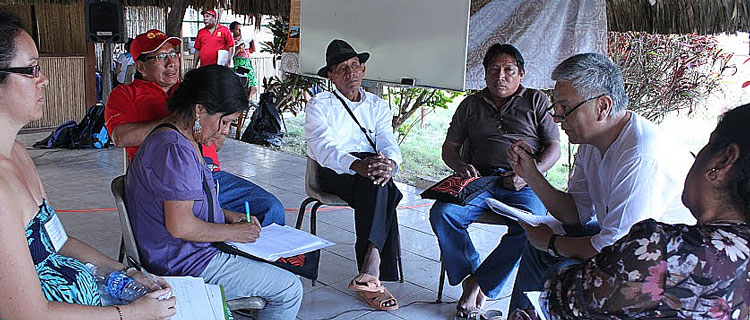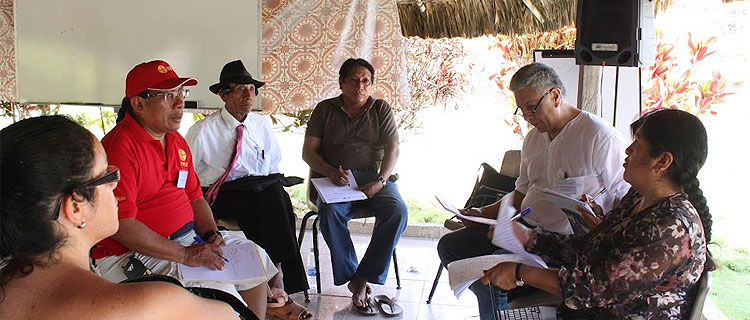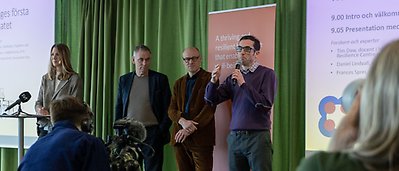

Dialogue seminars
Added values, crucial knowledge
Indigenous peoples and local communities recognised in new platform to curb biodiversity loss.
After several years of negotiations, the Intergovernmental Platform on Biodiversity and Ecosystem Services (IPBES) was finally established in April 2012. The platform aims to bridge the distance between science and policy and hopefully improve the understanding of biodiversity loss and how it affects human well-being.
A series of dialogues
In an attempt to bridge gaps between various knowledge systems, a series of dialogue seminars/workshops involving scientists, governments, indigenous peoples and local community representatives, international organisations and NGOs has been established.
Following up from a previous meeting in Jokkmokk (Sweden), a workshop was organised in the Panamanian indigenous autonomous region Comarca Guna Yala.
The workshop, entitled Knowledge for the 21st Century: Indigenous Knowledge, Traditional Knowledge, Science and connecting diverse knowledge systems Pdf, 8.8 MB., was held 10-13 April 2012 and was convened SwedBio, in collaboration with the Swedish Biodiversity Centre and the International Indigenous Forum on Biodiversity. Fundación para la Promoción del Conocimiento Indígena (FPCI) in Panama hosted the workshop.
Pdf, 8.8 MB., was held 10-13 April 2012 and was convened SwedBio, in collaboration with the Swedish Biodiversity Centre and the International Indigenous Forum on Biodiversity. Fundación para la Promoción del Conocimiento Indígena (FPCI) in Panama hosted the workshop.
The seminar fueled the optimism that various stakeholders would contribute to and enrich the work of the IPBES.
Download workshop report here Pdf, 8.8 MB.
Pdf, 8.8 MB.
Respect, reciprocity and cultural diversity
One of the first outcomes of the Panama workshop was a set of reflections that was brought onward to the Second Plenary Session of IPBES.
Respect: It is understood that all knowledge systems have their particularities and there should not be a supremacy of one knowledge system over another. Trust needs to be generated between the different parties to allow the exchange of knowledge systems to be effective and fruitful.
Reciprocity: The principle of reciprocity needs to underline sharing between knowledge systems. Finding complementarities in the different knowledge systems has been recognised as a way forward.
The inter-relation between biological and cultural diversity: Since time immemorial indigenous peoples have demonstrated how this relation generates and maintains biodiversity and ecosystem services. It is a relation where biodiversity is not at the service of mankind, but mankind is one element in a complex network.
Full and effective participation
Workshop participants also called for the full and effective participation of indigenous peoples and local communities at all levels in IPBES. For this to happen, a funding mechanism must be created to enable an effective dialogue between diverse knowledge systems within IPBES.
Finally, the international human rights framework must also be respected, including the UN Declaration of the Rights of Indigenous Peoples as well as lessons learnt from the process regarding the Nagoya protocol.
"The workshop outcomes informed the IPBES meeting and bolstered the openness and support for indigenous knowledge and diverse knowledge systems in the work of IPBES," says Joji Carino from the International Indigenous Forum on Biodiversity, one of the co-organisers of the Panama workshop.
LATEST NEWS
-

General news | 2024-04-24
Greentopia: music and sports events, a highway to sustainability?
Can music and sports events help societal transformations toward sustainability? During one of Sweden's premier festivals, Way Out West, the Centre co-hosts a climate summit to help answer that question.
-

General news | 2024-04-18
Centre research listed among top ten of most cited papers in policy
Three scientific works with heavy involvement from the Stockholm Resilience Centre have been included on a list of the ten most cited non-economics papers in policy documents by Nature
-

General news | 2024-04-10
Centre receives extended funding from Mistra for food research
The research programme Mistra Food Futures, in which the Centre is a partner, receives SEK 64 million for the upcoming four and a half years
-

Educational news | 2024-04-09
New planetary boundary game bridges education and climate action
A new innovative computer game lets Danish school children learn about key research on planetary boundaries
-

General news | 2024-03-08
First Swedish national citizens’ assembly on climate kicks off
How should Sweden lower its emissions to be in line with the Paris Agreement? This question is at the core as Sweden’s first national citizens’ assembly on climate starts on 9 March 2024
-

General news | 2024-03-08
Lisen Schultz listed as one of the most influential women in business in Sweden
Centre deputy director Lisen Schultz, director of the Executive Programme on Resilience Thinking, has been included on the list of most influential women within the Swedish business sector




